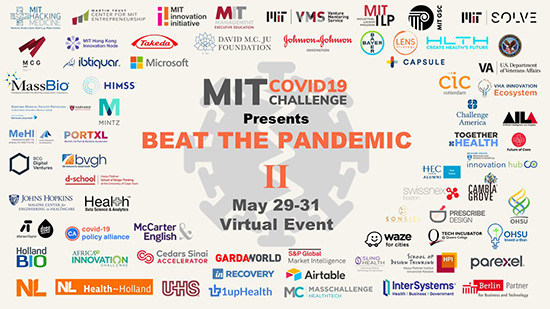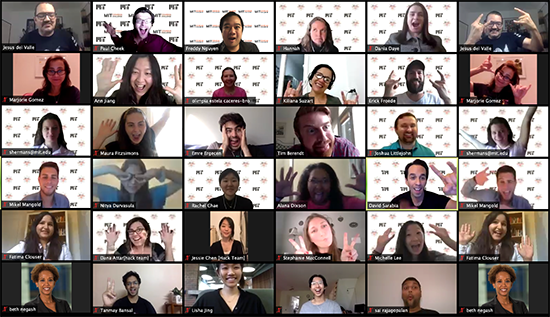Mentoring at MIT’s COVID-19 Challenge: 1,500 awesome new colleagues for a weekend
It’s one of life’s frustrations: no matter who you are, most of the smartest people will always be working for someone else. So, in this big world, no matter how great your team is, it pays to be connected with innovators across your industry.
That’s part of the draw of hack events – people ditch their company affiliations and titles at the door, and for a few days, they get to use their skills on problems that are bigger than any one company.
A week or two ago, I joined 1,500 designers, developers, entrepreneurs, patients, and health professionals who came together to hack ways to help people through the Recovery and Reopening from the COVID-19 pandemic. People joined from 40 countries, and all but two US states. I was one of the program’s mentors who provided technical and business insights to participants during the weekend through Slack, Zoom, and other apps.

Ester Dyson kicked off the program with the challenge to look beyond responding to problems themselves also to address the structural weaknesses that make them severe. She called out the way that short term thinking promotes addiction to ever-faster results at the cost of investing in longer-term progress.
“Addiction isn’t just drugs; it’s about people’s obsession with things which on their own may be perfectly good – except when they dominate having a future vision. Facebook is good. Sex is good. Money is good. But when you become so focused on anything in the short term that you disinvest in the future – then they become horrible. So think long term.”
By 10 pm, the participants had made nearly four hundred 45-second pitches clustered around the event’s eight tracks. This was all done remotely, and with globally diverse participants who got to know each other working and networking overnight. By 10 am Saturday, they had formed 205 teams, and then had only a day or to move from defining their need to designing solutions and a business model to sustain it.

Participants had been pre-assigned to tracks within two hemispheres of challenge: Recovery & Reopening, and Preventing, Predicting, and Preparing for Resurgence.
Recovery and reopening:
- The new surge, non-COVID patients: how do we shift attention to non-COVID patients, convince them its safe to seek care, and strike a balance between in-person visits and telemedicine.
- Well-being, adapting to the new normal: How do we rebuild the social fabric of our lives while maintaining safety and being socially connected. How do we balance between emotional, mental, and physical well-being?
- Growing up and educating in the new normal: how do we build solutions to support education at home, decrease exacerbated disparities, and assist the healthy development of students of all ages.
- Healthcare disparities: how to we build solutions to prevent COVID among vulnerable populations and support silenced groups due to disability, domestic violence, limited English proficiency, or poor health literacy?
Prevent, predict, and prepare for resurgence:
- Surfacing and communicating the COVID-19 truth: how do we surface factual and current information globally and distinguish it for subjective or biased information.
- Improving tests, access, and sharing results: How can we improve testing capacity, increase access, and improve data sharing of results.
- Nursing homes and assisted living facilities: How can we protect residents, workers, and families from contracting and spreading COVID-19.
- Medical equipment and the supply chain: How can we improve resource distribution and reallocate resources as areas of need shift withing hospitals, communities, regions, or countries?
These themes are home to some wicked problems. That’s why having all those motivated, new weekend coworkers is so exciting. For a few days, everyone believes that progress is not just possible, but all around them.
One of the participants I worked with, Jothi Arul Prakash Ponnusami summed this feeling up as finding the necessity which drives invention. Reading his post on Linked In, you can see how excited he was to be able to gather during social distancing and take on some of the difficulties we’ve all experienced.
Working remotely didn’t dampen the idealism people brought to this challenge of creating more fair and sustainable solutions for coping with COVID. For me, it was a chance to see if remote groups of strangers could self-organize – and to get to see a series of teams taking-on different needs while facing the same predictable challenges that are the hurdles to make effective solutions.
Your invitation to hack medicine
There are over 100 global events that gather volunteers to hack medicine around the world. MIT’s Hacking Medicine project hosts an updated list to find a healthcare hack that fits your schedule and interests. They also have a guidebook for organizing your own hacking medicine event to address needs in your community.
And regardless if you attend an event or not, you can find innovation frameworks and other events at MIT’s rallying point for entrepreneurship, MIT Orbit. I’ve missed the random meetings and insights events like this can provide. But thanks to the COVID Challenge, we had a digital dose of community that kept connecting innovators until we convene again in-person.

 The future of digital experiences will be built by strategists who grasp the full array of emerging business, social, and technical models. Specialties in user experience, branding, application design, and data science are laying the foundation for richer user experiences and business models breakthrough products and revenue based marketing.
The future of digital experiences will be built by strategists who grasp the full array of emerging business, social, and technical models. Specialties in user experience, branding, application design, and data science are laying the foundation for richer user experiences and business models breakthrough products and revenue based marketing.
3 Responses to "Mentoring at MIT’s COVID-19 Challenge: 1,500 awesome new colleagues for a weekend"
July 6, 2020
Nice online meet up with colleagues.
June 27, 2022
Wow, I love it! Thank you so much for sharing
July 4, 2022
Wow, I love it! Thank you so much for sharing